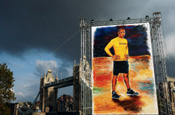Now Lewis Hamilton has been crowned world champion, fans can look forward to watching rivalries develop between the driver and his contemporaries as they race around ever-more spectacular circuits.
However, as the dust settles on a season that was also tainted by racist abuse of Hamilton and a sex scandal involving FIA boss Max Mosely, serious questions linger over the sport's future.
When tobacco brands were finally phased out of Formula One, finance brands were quick to fill the void. RBS, ING, Abbey and Credit Suisse joined the ranks of sponsors.
However, while brands such as Reebok are keen to associate with the sport, the future of RBS' involvement with the AT&T Williams F1 team could hang in the balance. According to sources within F1, the bank is considering pulling out of its sponsorship next year; RBS has even raised the possibility of an early termination of the deal, which affords the brand corporate hospitality opportunities, race tickets, access to drivers for promotions and branding opportunities.
Jon Ridgeon, managing director of sports marketing agency Fast Track, said: 'Whilst a partnership within a sport like Formula One provides a powerful marketing vehicle for RBS, we also understand the need to remain sensitive to the perception of excessive spending in challenging financial times. With the possibility of job losses and public funding in the financial services sector, spending significant amounts on sponsorship activation could clearly portray the wrong message to the public, its shareholders and its staff.'
'This said, RBS is tied into its contract with Williams and therefore the bulk of the costs involved are already committed. In addition, you could argue that at a time when marketing budgets are tight, the power of a relationship with a global sport like Formula One is even more important through its ability to connect RBS to both its existing and potential customers through their passion for the sport. The true global reach that Formula One delivers also has the ability to create awareness beyond the scope of many other marketing alternatives.'
'If budgets are tight however sponsors must prioritise the areas of activation which work best for the brand and generate the biggest ROI. RBS should therefore focus their activation budget on specific areas of the partnership that delivers the most effective return but still provides some overall saving', he said.
Meanwhile, the sport's chiefs met last week to discuss measures to reduce the teams' combined $1.6bn (£1bn) annual running costs.
Constructors' champion Ferrari said it would not compete if teams are forced to use the same engine type. This is almost certainly an empty threat, but the withdrawal of the team, which attracts the sport's biggest sponsors, could be hugely damaging.


